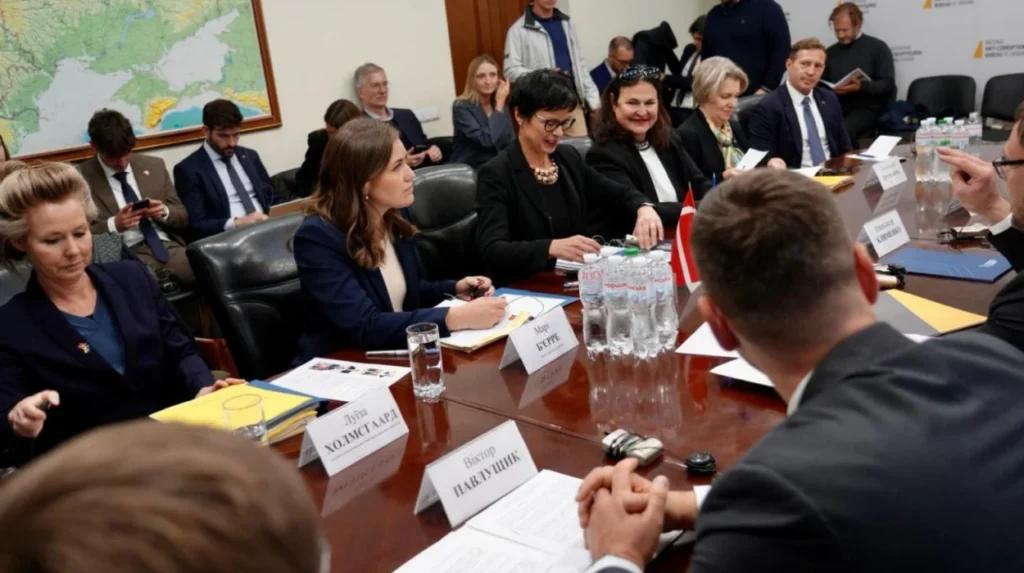Ukrainian efforts to join the European Union face a critical test in the form of strengthened anti-corruption institutions. Marta Kos, an influential voice in European integration and anti-corruption policy, emphasized that the independence and effectiveness of Ukraine’s anti-corruption bodies are indispensable if Kyiv hopes to secure full EU membership.
Speaking at a recent international forum on Ukraine’s EU prospects, Kos highlighted that while political will and reforms are central, “the credibility of anti-corruption agencies is the foundation on which Ukraine’s accession rests.” Her remarks underline a growing consensus in Brussels and among European capitals that anti-corruption measures are more than bureaucratic hurdles; they are non-negotiable elements of democratic governance aligned with EU norms.
The Imperative of Anti-Corruption Reform in Ukraine
Ukraine has made substantive strides since the 2014 Maidan revolution to reform its institutions, especially those combating graft and misuse of public funds. The establishment of the National Anti-Corruption Bureau of Ukraine (NABU) and the Specialized Anti-Corruption Prosecutor’s Office (SAPO) marked milestones. However, concerns remain about political interference, funding sufficiency, and legal safeguards that guarantee these agencies’ operational autonomy.
Marta Kos described these institutions as “cornerstones for Ukraine to gain the confidence of EU member states and the European Commission,” cautioning that inadequate reform could stall or even reverse Ukraine’s integration momentum. She stressed the EU’s demand goes beyond setting up bodies; it requires that these bodies function independently, free from political manipulation or selective justice.
The European Union has long branded anti-corruption reform as a “fundamental” criterion in the enlargement process. Several EU officials have conveyed that progress in Ukraine’s fight against corruption would influence the timeline and scope of accession talks. Observers note that this has placed Ukraine in the difficult position of balancing urgent economic and security needs while confronting entrenched corruption that undermines rule of law and public trust.
Challenges to Ensuring Independence
Ukraine’s political landscape proves challenging for truly autonomous anti-corruption institutions. Political elites and oligarchic interests still hold significant sway, often obstructing or attempting to influence investigative priorities and prosecutorial decisions. The appointment and dismissal of key officials in these bodies have periodically triggered alarm in EU capitals.
Kos pointed out that
“legislative guarantees must be fortified so that no government or parliamentary faction can undermine anti-corruption authorities.”
She urged reforms to enhance transparency in appointments processes and secure budgetary independence to shield these bodies from political pressure. Without such reforms, she warned, anti-corruption efforts risk becoming performative rather than transformative.
The European Union’s own assessment reports have repeatedly flagged gaps in accountability and the need for structural reforms. While there have been high-profile prosecutions, many cases are perceived as selective or stalled, contributing to skepticism domestically and abroad on whether anti-corruption bodies are equal before the law.
EU Member States’ Perspectives on Ukraine’s Progress
Across the European Union, member states have varying perspectives on Ukraine’s accession readiness, but anti-corruption reform remains a shared red line. Countries such as Germany, the Netherlands, and the Nordic states have specifically linked progress in Ukraine’s judicial and anti-corruption frameworks to continued political and financial support.
Marta Kos reflected that “solidarity with Ukraine does not imply overlooking institutional weaknesses; rather, it necessitates addressing them with rigor and transparency.” She acknowledged the geopolitical backdrop of Russia’s ongoing aggression but emphasized that the EU’s enlargement policies must maintain consistent standards.
This stance signals that Ukraine’s accession bid will be judged not solely on its democratic resilience amid conflict but on verifiable benchmarks of governance and judicial independence. The credibility of Ukraine’s anti-corruption agencies, therefore, stands as a litmus test in Brussels’ eyes, determining whether Ukraine becomes a full member or remains in a prolonged candidate limbo.
Supporting Ukraine’s Reform Efforts
Recognizing the high stakes, the EU and international partners have ramped up support programs designed to bolster Ukraine’s institutional integrity. This includes technical assistance, funding for transparent procurement and judiciary mechanisms, and capacity-building efforts to empower anti-corruption officials.
Marta Kos praised these efforts, noting,
“external support provides both resources and a shield, but the ultimate responsibility for reform lies with Ukraine’s leadership.”
She called for domestic political consensus to institutionalize reforms beyond short-term political cycles, embedding anti-corruption principles as national priorities irrespective of government changes.
International watchdogs like Transparency International and the Council of Europe continue to monitor Ukraine’s progress, offering reports and recommendations aligned with EU standards. Their findings reiterate that sustained political will, coupled with reforms ensuring the independence of organs such as NABU and SAPO, are prerequisites to unlocking full membership benefits, including market access and structural funds.
The Broader Impact of Anti-Corruption on EU Integration
The focus on anti-corruption institutional independence extends beyond Ukraine’s borders. It fits into the broader EU agenda of reinforcing enlargement countries’ governance systems to protect the Union’s stability, security, and legal order. This framework also sends a clear signal to other aspirant states in the Western Balkans and Eastern Partnership regarding the EU’s standards and expectations.
By insisting on robust anti-corruption mechanisms, the EU aims to prevent backsliding and cultivate democratic resilience. Marta Kos connected this regional strategy directly to Ukraine, affirming that
“Ukraine’s success or failure in this arena will echo far beyond Kyiv, influencing Europe’s integration architecture for years to come.”
In conclusion, Ukraine’s path to EU accession increasingly centers on more than military and diplomatic challenges; it hinges on building and safeguarding anti-corruption institutions that reflect genuine independence and efficiency. Marta Kos’s insights underscore that without these reforms cemented, Ukraine risks stalling on the doorstep of Europe despite the historic opportunities and sacrifices at play.







